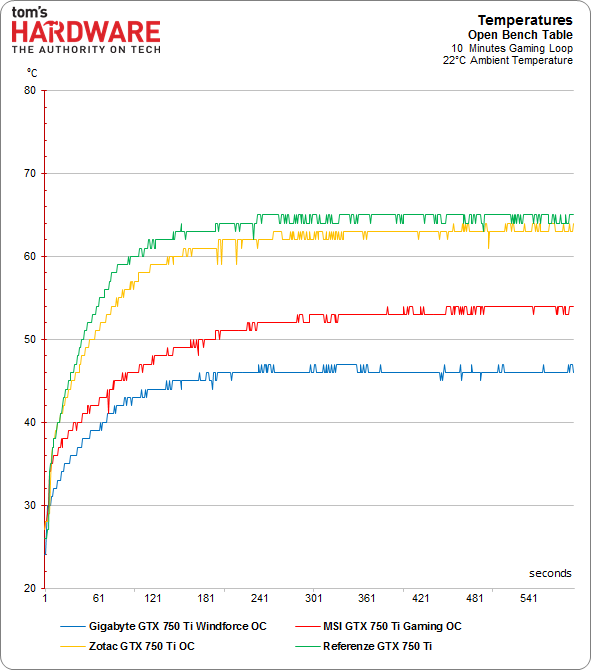GeForce GTX 750 Ti Review: Maxwell Adds Performance Using Less Power
Temperatures And Acoustics
Temperatures
Our thermal measurements come from a long loop of the Metro: Last Light benchmark. By the end of the chart, you should be looking at the highest temperatures you'd see in a real gaming environment. Of course, depending on the title, you could certainly be looking at lower readings.
Two of our labs ran tests in closed mid-tower cases, finding the various GeForce GTX 750 Ti cards to vary by one to two degrees. Even though these cards dissipate heat internally, rather than through their rear I/O slots, the fact that they use so little power means heat is hardly an issue.
| Model: | Idle | Gaming Load |
|---|---|---|
| GeForce GTX 750 Ti Reference | 28 °C | 65 °C |
| Gigabyte GTX 750 Windforce OC | 25 °C | 45 °C |
| MSI GTX 750 Ti Gaming OC | 26 °C | 54 °C |
| Zotac GTX 750 Ti OC | 27 °C | 63 °C |
The following chart demonstrates that each card's temperature curve is affected by the heat sink, fans, and BIOS-based fan profile.
Gigabyte cools its card very aggressively, and could have pulled back on fan speed to bring noise down even more (even though the card is hardly audible as it sits).
Noise
We record noise measurements for each card using a studio microphone calibrated for our PC audio tests. The mic is oriented perpendicularly to the graphics card's center, 50 cm away.
| Model: | Idle | Gaming Load |
|---|---|---|
| GeForce GTX 750 Ti Reference | 31.5 dB(A) | 34.1 dB(A) |
| Gigabyte GTX 750 Windforce OC | 31.9 dB(A) | 33.2 dB(A) |
| MSI GTX 750 Ti Gaming OC | 30.0 dB(A) | 31.9 dB(A) |
| Zotac GTX 750 Ti OC | 31.1 dB(A) | 33.0 dB(A) |
It really worked out well that we received so many GeForce GTX 750 Ti cards for our launch coverage, since we're able to take measurements from products with big, beefy coolers and others (like the reference board) with tiny orb-style heat sinks.
Nvidia's own design proves that it doesn't take much to keep GM107 cool. A small sink and fan are all you need, really. And in a closed chassis, you aren't going to hear any of these four samples.
Get Tom's Hardware's best news and in-depth reviews, straight to your inbox.
With that in mind, MSI's GTX 750 Ti Gaming OC appears to offer the best compromise between quiet operation and high performance. It's just too bad that the MSI and Gigabyte boards employ such big, bulky coolers. The whole point of Maxwell is efficiency; we'd like to see vendors start introducing thermal solutions to match.
Current page: Temperatures And Acoustics
Prev Page Professional Applications Next Page Power Consumption: Gaming-
meluvcookies on performance, I'll take the extra frames of the 265, but damn, for 60w, I'm totally impressed by this card. both the 750Ti and the R7 265 would be decent upgrades from my aging GTX460.Reply -
s3anister ReplyBut without the big cooler, GTX 750 Ti is daintier than a lot of sound cards we've tested.
I'm pretty sure you meant to type "video cards" on page one there. Cheers. -
Bloob AlsoReplyIt’s difficult to make this story all about frame rates when we’re comparing a 60 W GPU to a 150 W processor
Is a bit confusing. -
cangelini Reply
Actually meant sound card :) It's definitely smaller than a small video card, but I even have sound cards here that are larger.But without the big cooler, GTX 750 Ti is daintier than a lot of sound cards we've tested.
I'm pretty sure you meant to type "video cards" on page one there. Cheers. -
Sangeet Khatri Well.. there is not a lot of performance in it, but I love it for a reason that it is a 60W card. I mean for 60W Nvidia has seriously nailed it. The only competition is way behind, the 7750 performs a lot less for similar wattage.Let's see how AMD replies to this because after the launch of 750Ti, the 7750 is no longer the best card for upgrading for people who have a 350W PSU.I don't generally say this, but Nvidia well done! Take a bow.Reply -
houldendub Nice little card, awesome! I feel like this would be an absolutely awesome test bed for a dual chip version, great performance with minimal power usage.Reply -
thdarkshadow The whole time I was reading the review I was like it isn't beating the 650ti boost... :( but then I remembered it uses less than half the power lol. I am impressed nvidia. While I make purchases more on performance than power consumption I can still appreciate what nvidia is doingReply -
houldendub Reply12707408 said:Anybody else notice the lesser shaders and TMUs on the Zotac card in GPU-Z?
Don't take this as fact, but the drivers look newer for the Zotac card than the others, possibly just a bug with the older drivers? The cards are advertised as having 640 shaders anyway.
Also weird, the GPU-Z screenshot is taken with Windows 8, whereas the Gigabyte and MSI cards are on Windows 7. The mystery continues...

